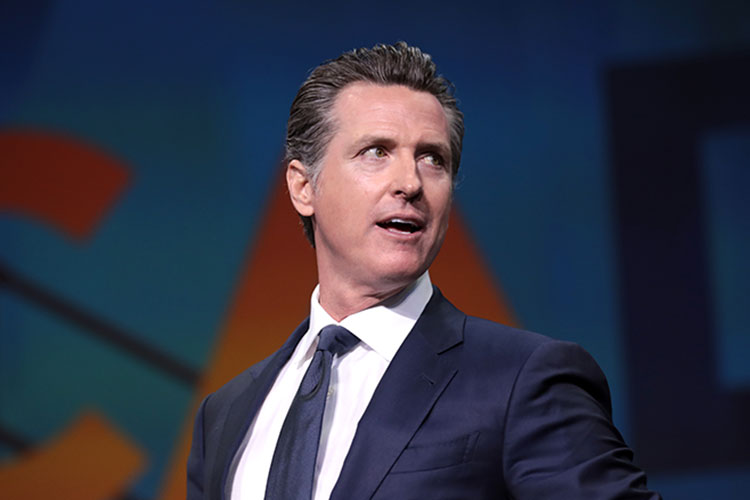Newsom holds only slim margin in recall vote, Berkeley IGS Poll finds
GOP fired up about recall, while many Democratic voters haven't tuned in, analyst says
July 27, 2021

California Gov. Gavin Newsom holds only a narrow lead among likely voters in defending against a Sept. 14 recall election, according to a new poll by the UC Berkeley Institute for Governmental Studies. To expand his lead, one Berkeley analyst says, he will need to galvanize his supporters to counter the passionate recall support among Republicans and conservative groups. (Photo by Gage Skidmore via Flickr)
Less than two months before the recall vote, California Gov. Gavin Newsom holds only a narrow lead among voters most likely to go to cast a ballot, according to a new poll from the UC Berkeley Institute for Governmental Studies (IGS).
The sitting governor holds a wide lead among the general electorate, reflecting the overwhelming dominance of Democrats in California. But while Democratic voters and those with no party preference are not yet engaged in the campaign, the poll found, those who support the recall, most of them Republicans, are fired up and frustrated by the governor’s handling of the pandemic shutdowns, homelessness and other high-profile issues.
In all, the IGS Poll found that nearly 90% of Republicans express a high interest in voting on Sept. 14, while less than 60% of Democrats and those with no party preference express a similar level of engagement.
“At least so far, Democrats haven’t seen the recall as a big threat, and so they’re not mobilized,” said IGS co-Director Eric Schickler. “The governor seems to be betting that, in the last six weeks, his campaign will have enough funding to do advertising, field work and everything else needed to get their message to their voters. That’s going to be the big challenge for them.”
The recall election is an effort initially backed by supporters of former President Donald Trump, COVID-19 vaccine opponents and other conservative groups to remove Newsom, a Democrat, before end of his first term next year.
For most Californians, the September ballot will offer only two questions: Should Newsom be removed from office, and who should replace him?
Nearly 50 alternative candidates are on the ballot, predominantly Republicans but also a some Democrats and contenders from other parties.
Respondents to the IGS Poll put conservative broadcast personality Larry Elder in the lead among challengers, with 18% of likely voters listing him as their first choice. Two other Republicans — businessman John Cox and former San Diego Mayor Kevin Faulconer — each are the first choice among 10% of likely voters. Cox lost the 2018 governor’s race to Newsom. In all, 40% remain undecided.
Among the broad electorate, 51% of respondents to the Berkeley IGS Poll said they would reject the recall and support keeping Newsom in office. Some 36% of California registered voters favor the recall. Those numbers have held essentially steady all year.
The poll found substantial disparities when evaluating voters by race and gender.
While whites account or 53% of all registered California voters, the poll’s assessment of likely voters found that they could account for two-thirds of the recall vote. Black and Latino voters are “much more inclined” to oppose the recall, the poll found.
The poll also found “a significant gender gap” among those most likely to vote: By a margin of 13 percentage points, women say Newsom should be retained in office. Men favor his ouster by seven percentage points.
Republicans see ‘their best chance to knock off Gov. Newsom’
The disparity in voter engagement and the surprising closeness of the race means that Newsom will likely mount an assertive defense in the weeks ahead. In Schickler’s view, the governor may be aided by the state’s relative success in controlling COVID-19, including the new Delta variant, and by the state’s strong economy and large budget surplus.
Plus, he said, Newsom has a significant advantage in campaign funds.
“They have a big war chest,” he said. “They were probably always planning to spend that money in the weeks leading up to the election. And they don’t need to turn the dial that much to get enough turnout to fend this off…. If they’re able to get some portion of these Democratic-leaning voters engaged enough to vote, that’s probably going to be enough.”
Still, Schickler said, the poll may give Republicans hope.
In a general election, there would be other races and other issues to galvanize the heavily Democratic state electorate, he explained, while a recall election with low turnout could favor the GOP forces.
“From their perspective, this still is probably their best chance to knock off Governor Newsom,” he said. “Even though the governor’s overall approval ratings are pretty solid right now, this enthusiasm gap at least gives them a chance — though I wouldn’t say a great chance.”
The poll was administered online in English and Spanish from July 18-24 among 5,795 registered voters across California. The margin of error among all registered voters is about 2 percentage points. For the sample of voters most likely to vote in the recall election, the margin of error is about 2.5 percentage points.